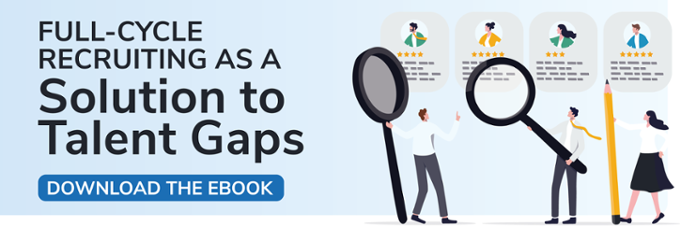Topic Talent Acquisition
How to Build a Talent Pipeline with Full-Cycle Recruiting

September 5, 2023 | By Questco Companies

Talent acquisition isn't just about filling a vacant position; it's about foreseeing future needs and being prepared. A robust talent pipeline ensures employers have a steady stream of qualified individuals ready to step in when needed.
But how does one build such a pipeline?
Enter full-cycle recruitment. This comprehensive approach to hiring streamlines the recruitment process and enhances the candidate experience. By integrating strategies like employer branding, candidate sourcing, and leveraging tools like Applicant Tracking Systems (ATS), full-cycle recruitment becomes the linchpin of successful talent management.
However, full-cycle recruitment takes much more time and effort than just posting your position on a job board. Full-cycle recruiting services can be a lifesaver for businesses without this extra bandwidth.
What is a talent pipeline?
A talent pipeline is a proactive approach to recruiting, where employers create a steady stream of potential candidates for future roles. Think of it as a reservoir of talent, ready to be tapped into when needed.
This reservoir isn't just filled with active job seekers; it includes passive candidates who might not be actively looking for a new role but are the perfect fit for a company. By maintaining a talent pipeline, employers ensure they have a pre-qualified pool of candidates, reducing the time-to-hire and filling vacancies with top talent.
Recruitment strategy plays a pivotal role in building this pipeline. This heavily involves employer branding, creating an image of the company that attracts the right talent.
Recruitment marketing, networking events, and employee referrals are all crucial components of this strategy. They help not only attract candidates but also engage and nurture them.
But how does one ensure that this talent pipeline remains robust and effective? The answer lies in full-cycle recruitment.
What is full-cycle recruiting?
Full-cycle recruiting, often called end-to-end recruitment, is a comprehensive approach encompassing every phase of the hiring process. This method ensures a seamless and efficient recruitment journey from the initial job analysis to the final onboarding of a candidate.
But what exactly does it entail?
At its core, full-cycle recruiting starts with clearly understanding the job role and its requirements. This clarity ensures that job postings are precise, attracting the right talent from the get-go.
Once these postings are live on various platforms, candidate sourcing kicks in. This phase taps into active and passive candidates, ensuring a diverse and rich talent pool.
As applications start pouring in, the screening process begins. Resumes, cover letters, and initial assessments help shortlist candidates who align with the job's requirements.
Following this, the interview phase takes over. It's not just about assessing skills but also understanding the candidate's experience and ensuring they align with the company's values and culture.
After these rigorous rounds, the most suitable candidate emerges. They're then extended a job offer, which might involve negotiations regarding terms like salary or benefits. Once everything's agreed upon, the onboarding process ensures the new hire integrates smoothly into the team and the organizational culture.
Now, while full-cycle recruiting is a game-changer, it's essential to understand its relationship with the talent pipeline. After all, a robust recruitment process is only as good as the talent pool it taps into.
How does full-cycle recruiting impact talent pipelines?
By embracing full-cycle recruiting, employers can ensure a proactive approach to hiring. Continuous sourcing and engagement mean there's always a ready pool of active and passive candidates waiting in the wings. This speeds up the hiring process and ensures that only the most suitable candidates make the cut.
Quality over quantity becomes the mantra. Instead of sifting through countless resumes, employers have a refined and high-quality talent pool. This focus leads to reduced time-to-hire, ensuring that vacancies are filled promptly, and keeping business operations smooth.
In addition, with a pre-existing pool of candidates, the costs associated with prolonged vacancies and high turnover rates diminish.
In the ever-evolving landscape of talent acquisition, staying ahead is crucial. By integrating full-cycle recruiting into the HR strategy, employers fill current vacancies and prepare for future needs.
Why outsource full-cycle recruiting?
For many business owners, juggling core operations while managing recruitment can be overwhelming. Outsourcing full-cycle recruiting emerges as a beacon of relief, especially for those lacking the bandwidth to handle the intricate recruitment process. But what makes outsourcing the ideal choice?
Advantages of Outsourcing:
- Expertise at Your Fingertips: Specialized agencies bring a wealth of experience, ensuring recruitment aligns with industry best practices, without business owners needing to become experts themselves.
- State-of-the-Art Tools Without the Hassle: No need to invest in or learn the latest Applicant Tracking Systems (ATS) or recruitment software. Agencies come equipped, saving time and resources.
- Broadened Horizons: Agencies have extensive networks, granting access to a diverse pool of candidates that might otherwise remain untapped.
- Cost and Time Efficiency: While there's an initial investment, the long-term savings in time and potential hiring mistakes are invaluable. Plus, reduced vacancies and turnover rates translate to consistent business operations.
- Focus on What Matters: Outsourcing allows business owners to channel their energy into their core business functions, driving growth without recruitment distractions.
Reputable recruitment agencies prioritize understanding a company's culture and needs, ensuring alignment in their hiring efforts. The slight initial investment is dwarfed by the long-term gains in efficiency, quality hires, and peace of mind.
For business owners stretched thin by myriad responsibilities, outsourcing full-cycle recruiting isn't just a choice; it's a strategic move. It offers a pathway to top-tier talent without the stress and time commitment of in-house recruitment.
Why use Questco's full-cycle recruitment services?
Questco combines precision and speed. Consider this: the average time to fill a position with Questco is a mere 27 days. This starkly contrasts the industry standard of 42 days, as reported by the Society for Human Resource Management (SHRM). Such efficiency doesn't just translate to time saved but also to operational continuity and reduced recruitment costs.
However, speed isn't the only feather in Questco's cap. The approach is holistic. While some recruitment services might stop at merely posting a job and leaving businesses to grapple with an avalanche of resumes, Questco is different.
The proactive approach ensures no stone is left unturned in the quest for the perfect candidate. A testament to this is the fact that in 2022, a whopping 90% of candidates placed by Questco were passively sourced.
These high-caliber individuals weren't necessarily on the job market but were identified, approached, and recruited thanks to Questco's comprehensive full-cycle recruiting services.
Opting for Questco's full-cycle recruiting services is akin to having an elite recruitment squad dedicated to your cause. From managing job postings to sifting through applicants, from aggressive sourcing to leveraging professional networks, every step is meticulously handled. The goal? To ensure that businesses don't just get a candidate, but the right candidate, and in record time.




